UNSUNG HEROES
Shanet Rutgers — helping to create a more secure future for African penguins
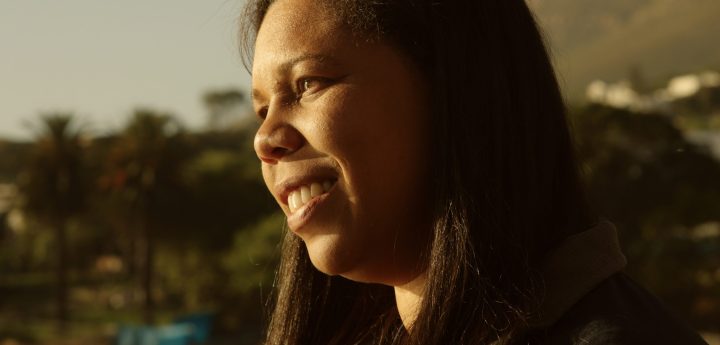
Initially working as a volunteer at the Two Oceans Aquarium, Shanet Rutgers is now the head of penguin care at the aquarium. Her mission is to create awareness about the plight of African penguins in the hope of ensuring a sustainable future for Cape Town’s feathered residents.
Shanet Rutgers’ passion for penguins was ignited in early 2000 when her mother took her to the Two Oceans Aquarium for the first time. Here, she witnessed African penguins being fed and told her mother, “I want to be the lady feeding the penguins.”
Slowly, this dream began to materialise.
When she was 15 years old at Kensington High School, Two Oceans Aquarium sent a letter soliciting applications for the De Beers marine biology course. This would allow a person to volunteer at the aquarium and write an exam to earn a certificate of qualification.
“I sent a motivational letter and got accepted,” says Rutgers.
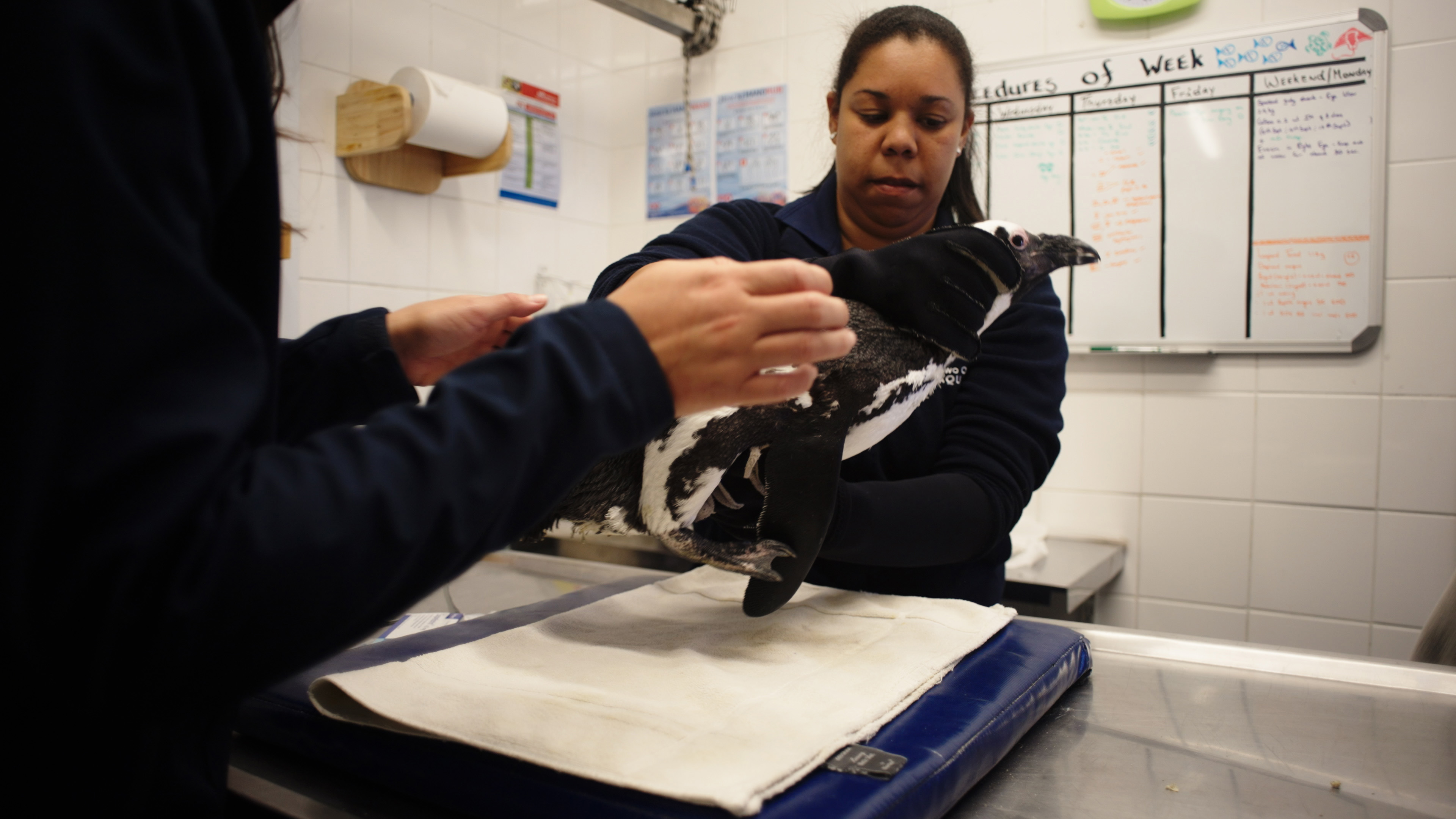
Studying animal health allowed Shanet Rutgers to work with penguins in a more hands-on way. (Photo: @2oceansaquarium)
Instead of spending her holidays with her friends, Rutgers was at the aquarium, working alongside animals and educating guests on what she had learnt.
“I liked teaching and I like making sure everybody knows what I know. I always tell myself that if you die with all the information, it means nothing… if you can share that information with the next person, it’s something you leave behind,” says Rutgers.
Becoming a caretaker
Rutgers was persistent and applied for any job that was available at the aquarium.
“The person who was working with penguins left in 2014. They needed someone and they picked me,” says Rutgers.
In 2020, Rutgers became the head of penguin care at the Two Oceans Aquarium. She studied for an animal health diploma at UCT and graduated in 2021.
“I was able to interact with the birds on an educational and husbandry level. But also on a clinical level. I could see if something was wrong with the bird, and interact and know exactly what was wrong with it,” she said.
Studying animal health allowed her to work with penguins in a more hands-on way, which further fuelled her passion for them. However, an animal health technician cannot prescribe anaesthesia but can work alongside a vet to perform certain procedures.
“We can provide vaccinations with a veterinarian on site,” she says.
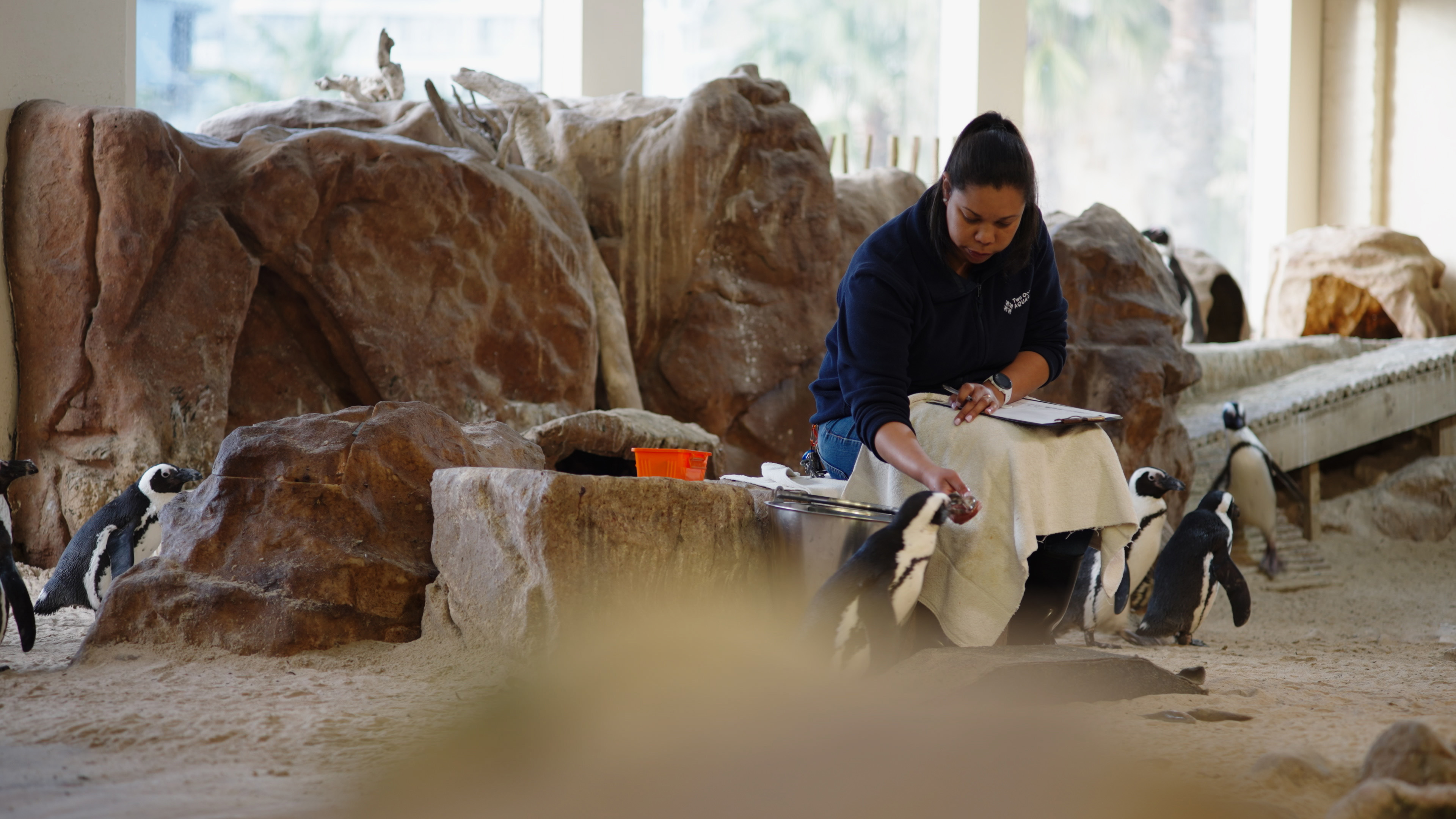
Shanet Rutgers’ passion for penguins shines as she shares insights into their behaviours, feeding habits and the unique personalities that make them so special. (Photo: @2oceansaquarium)
Typical health concerns for penguins in captivity include bumblefoot, a pseudopodium that forms beneath the foot.
“It’s a little pus bump… like a bedsore. It is very painful for penguins because they’re walking on their feet. You need to have different substrates for that. So it’s very important for us as keepers to check their feet daily,” says Rutgers.
While working with penguins, it’s important to plan things the day before.
“Because we do public feeds, we have to schedule our day around it,” she says.
By 9am she is in the kitchen, de-shelling prawns and preparing squid and sardines. After this, she rakes the enclosure’s “beach”, cleans the exhibits and begins feeding the 20 African penguins and 14 rockhopper penguins.
“You never know what is going to happen because penguins can be unpredictable. You’ll often get a penguin who decides to fight with another penguin. This can lead to eye injuries… They also bite each other on their flippers and leave open wounds.
“No matter how well you plan your day, things like this take time,” she says.
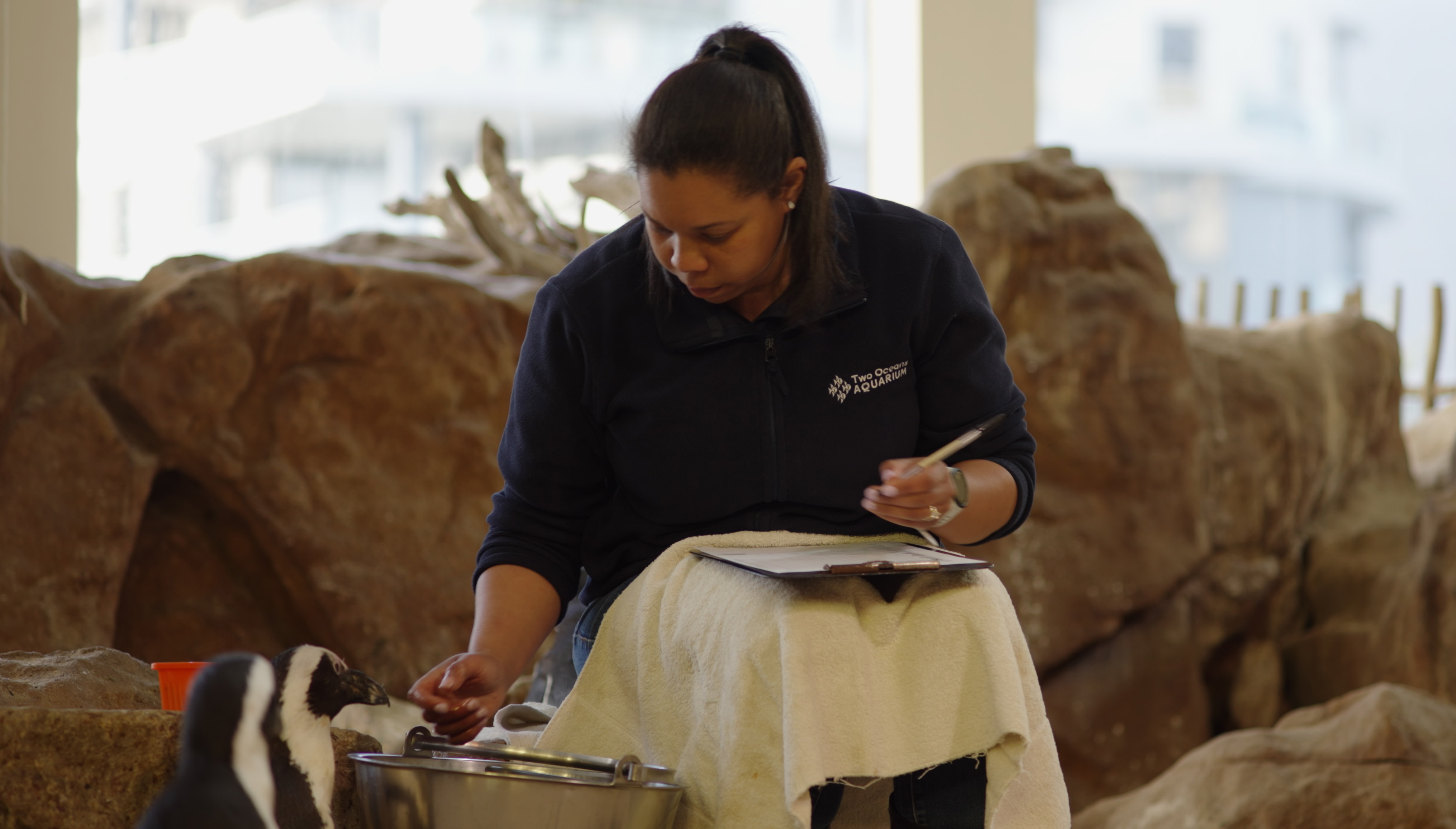
Shanet Rutgers attends to her charges. (Photo: @2oceansaquarium)
Rapid population decline
According to the IUCN Red List, African penguins will be listed as functionally extinct by 2035, meaning there won’t be enough birds to produce a colony.
“At the aquarium, we do a lot of presentations around our penguin feed, specifically talking about the fish produce that’s a problem within South Africa, and the pollution, which affects the penguins’ natural habitat,” says Rutgers.
To take action against overfishing, the World Wide Fund for Nature (WWF) established the South African Sustainable Seafood Initiative to educate people about sustainable seafood.
Sardine populations, a staple in the African penguins’ diet, are plummeting.
“My role here is to teach as much as I can. We also have a global campaign called ‘Not On Our Watch’ to promote awareness of the African penguin and how scarce the animal is in the wild,” she says.
Not On Our Watch was launched on 1 March 2023 with a specific focus on the African penguin. The campaign is supported by several conservation organisations including WWF-SA, Endangered Wildlife Trust, South African Association for Marine Biological Research, Southern African Foundation For The Conservation Of Coastal Birds, Birdlife South Africa, African Penguin and Seabird Sanctuary, Dyer Island Conservation Trust, Animal Ocean and Nelson Mandela University.
Read more in Daily Maverick: Penguins survived multiple crises – but can Africa’s doughty ‘climate refugees’ ride the latest storms?
In the early 1900s, it was estimated that 1.5 million African penguins lived on Dassen Island off the West Coast. This is where African penguins were discovered for the first time, says Rutgers.
The island was covered in guano; penguin poo.
“Guano is interesting because it helps regulate the temperatures for penguins and their eggs, which is why they dig their nests on top of guano,” says Rutgers.
The discovery of these penguins led to a demand for their eggs, then considered a delicacy. Also, guano was found to be an extremely good fertiliser, she says.
“People started harvesting the guano, which then affected the penguins’ temperature. They were left exposed to elements such as rain, wind and sun.”
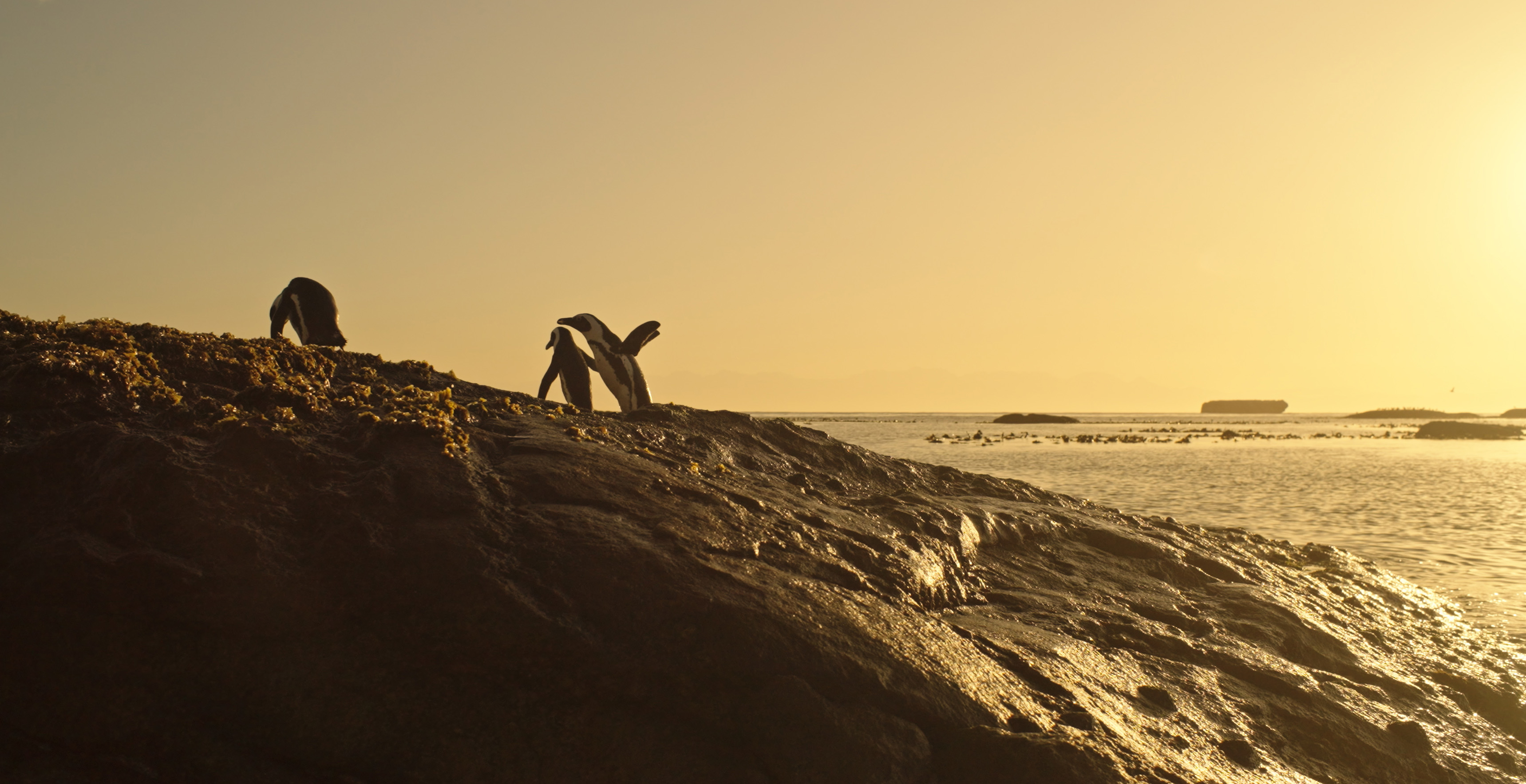
African penguins at Boulders Beach near Simon’s Town, Cape Town. (Photo:@2oceansaquarium)
This led to the colony looking for new habitats such as Robben Island, and later, Boulders Beach in Simon’s Town, where they used the rocks as a natural protection against the elements.
“Penguins started foraging for food closer to these places and began nesting sites to find a safer place because Dassen Island was being stripped,” she says.
This resulted in a significant decline in the penguin population as the journey to these new locations left them vulnerable to attacks in both the sea and on land. They were also increasingly exposed to people.
“It’s not a steady decline. It’s a rapid one, and it goes faster each year. The most recent count shows we have about 10,000 African penguins left in the wild,” says Rutgers.
Today, pollution is one of the biggest concerns for the surviving population.
“These penguins die from starvation as the few fish they manage to catch often contain microplastics, or they get caught in cable ties and plastic debris,” she says.
Education inspires change
“We need to do everything in our power to make a change… At the end of the day, we are the ones destroying the environment, not the animals,” says Rutgers.
This includes beach clean-ups, eating sustainably and living a sustainable lifestyle. But most importantly, individuals and companies should educate themselves.
“You can teach until you’re blue in the face. But it’s up to that person to take what you’ve taught them and make practical use of it,” she says.
Two Oceans Aquarium has a biodiversity management plan which involves the government and is discussed every 10 years.
“We [also] get the public on board and allow them to give comments and offer advice on how we can make changes for the African penguin,” she says.
“[Rutgers] has learnt through experience, and many years on the job, what is the best possible way to care for the aquarium’s penguin colony,” says Heather Wares, communications officer at the facility.
Rutgers is also able to share complex information in a manner whereby people of all ages can understand, says Wares.
“She leads her team with an ethos that shows a close personal relationship with the birds while remaining respectful to their status as endangered wild animals.”
Rutgers says if she can see just one child talk about the African penguin, it makes her happy.
“Then I know I’ve made a difference somewhere.” DM






















 Become an Insider
Become an Insider
Comments - Please login in order to comment.